#western dwarves
Text
dragon age comics covers vs dragon age comics themselves


#like im sorry to whoever does them but they are SO UNPLEASANT to look at#everyone looks ugly wierdly pink-grey nobody is on model (looking at dwarves specifically) the poses are stupid and the women dont have#any organs#dragon age critical#i honestly dont like western style of comics at all anyway but those are especially fugly
84 notes
·
View notes
Text
Inside of me are two wolves.
One really loves the way the fandom moniker "Kabru of Utaya" sounds and how it gives Kabru the dignity of a full name, and how it connects him to his past.
The other knows that "[x] of [location]" is canonically the dwarven cultural naming practice and thus Kabru would never go by it in canon.
#THIS BOTHERS ME SO MUCH....#Kabru#babe. we have GOT to get you a last name.#this is such a potentially painful subject to think about especially postcanon#he's got like ... an official role in government. does he have to sign documents? be announced in court?#like “[x] of [location]” is such a common western fantasy trope and also existed in real life#so naturally we as fans just kind of fill it in ... but Kui had to decide that dwarves do that specifically#so I know that in-universe it would be off the table. like a white person taking a Japanese name or something.#especially when. again. you are a royal advisor. real political blunder territory.#I need to explore this in a fic for real#Dungeon Meshi#posting for one as usual
82 notes
·
View notes
Text
finished redcliffe + the circle tower today, alongside the first bulk of denerim (the dark wolf quests, alistair's quest - jessamine always ends up hardening alistair - all the possible side quests) i think tomorrow is most likely vigil's keep into haven into fighting flemeth for morrigan.
#i've found my favourite way to do dao as jess is: redcliffe/mages > dwarves > elves#it just makes sense to do the dwarves while you're on the western side of ferelden and then go recruit on the elves then head north to-#-denerim. think about the travel times.#jaime da lb
0 notes
Text
Saw a comparison chart with Solas and Cassandra at like 5'8" to 5'10"-ish and Varric at 4'8"/9" so definitely going with those heights for a crossover verse because it puts Calem at only like, two inches taller than Varric.
#considering so many races are either very tiny or very giant in ffxiv#it's always fun to put calem who is a short miqo#along side the relatively big folks in western games#Krile against varric would probably be hillarious too though#considering lalafel are between#2 foot 10 and 3 foot 2 at TALLEST#and dragon age dwarves range 3 foot 11 to 4 foot 11 I think.#ffxiv#dragon age inquisition
1 note
·
View note
Text
woowww yeah i can't believe the sdv update has been out so long and most i've heard is that it's great and now that i'm finally trying to catch up with the content i'm finding out it gives me the icks. uhhhmmm.
#like. i can't buy leo being good enough at speaking english but adopting gibberish unstructured broken english due to being raised by birds#and then reverting to more proper english when the farmer interacts with him more#like. realistically for me the question would be do the birds know broken english because of leo or#because there were a native population of humans whose languages were not natively english but they picked up their own pidgin#and those people taught the birds that#like leo speaking Like That feels shoehorned if there's no context of native islanders being there and being an influence#like. oh so joja is bad for coming here to pelican town and trying to take over the local economy at the expense of the local community#but it's ok for the farmer to do the same bc hey conveniently nobody is here except for white people who are free not to abide by#any culture different to theirs#an any natives are actually just the nonhuman dwarve race same as the guy u see in the mines so it's fine#meanwhile the entire aesthetic of the island and the trope of the stranded western child and western archeologist#are reminiscent of exploitation films!!!#it's a bad taste in my mouth and i'm in like. highkey disbelief
1 note
·
View note
Text
Okay so I'm giving @corseque 's super-important audio of all Solas' comments about the Blight a second (or fifteenth, whatever) listen and taking notes as I go.
Solas doesn't think for a second that once the archdemons are gone the Blight will be gone. Which really makes sense because it's the Blight that makes them an archdemon, not the other way around. Supposedly, they're blighted when the darkspawn reach and corrupt them. But of course that begs the question of why it's only darkspawn (and uh, honorary darkspawn like the Wardens) that hear their call. Anyway, the way he says it, it sounds more like the archdemons are a limiting factor than a driving factor.
Varric: "What's so confusing about endless darkspawn?" Solas: "A great deal!" So yeah, whatever the plan was, he didn't foresee darkspawn as a consequence. So did he not foresee them existing at all, or not foresee them being free to cause problems? Worth noting that it's really clear both in general and in Descent that dwarves as a whole were a huge blind spot for him.
He is really really surprised that the Western Approach ever recovered from the Blight. Pretty clear he didn't think that was possible.
He thinks that everything the Wardens have done up til now is a deeply misguided effort that's served (mostly accidentally) as a delaying tactic. Gotta say, with the information we have at hand, this point pairs about as well with the last as a nice dry red with spicy pickles. If the Wardens shouldn't have done what they've done, but he didn't think recovery from the Blight was possible, I'd love to hear what he thought the alternative was.
Same dialogue as above, but when Solas talks about stopping the Blight and when Blackwall and Varric talk about it, one gets the distinct impression that they're talking at cross purposes, because Varric and Blackwall are talking about the experience of Blights, as in, periodic events, whereas I think Solas is talking about THE Blight, that is, its true nature, which is yet untouched.
He thinks Erimond is dumb as shit, which is fair and valid. "That's madness! For all we know, killing the Old Gods could make things even worse!" he says. Well, he knows a lot more than "we" know, but it's entirely possible that he doesn't for sure know this. Increasingly clear that he thinks it, though.
I'd forgotten just how pissed off he was about the Grey Warden plan to kill the Old Gods before they were corrupted. It really doesn't give "hey you're killing my relatives" energy. It really gives "wow that would fuck us all" vibes.
Of course, with a side of my remembering that Solas' besetting flaw was always thinking people should know better even though they don't have access to the knowledge he has. That flaw I WILL grant. He displays it repeatedly--you could even say the writers went out of their way to make the point.
"The Blight is the real problem"
"The fools who first unleashed the Blight on this world thought they were unlocking ultimate power." Anyway yeah those are the absolute core of everything here. The Blight is the real problem and the Blight was deliberate. Deliberately made or deliberately freed.
Even during the events of Inquisition, Solas obviously sees Corypheus as secondary to the Blight as a danger.
Cassandra suggests that the archdemons were really just dragons--"Pets to those who no longer exist", by which she probably means the Old Gods, not specifically the gods of Elvhen, just because of her cultural background. Solas finds this suggestion amusingly wrong--a quiet snort, and "I would not go so far as that."
Last notes: he doesn't sound like he thinks the Blight can be stopped, and he's adamant that it can't be controlled. Which is presumably why he broke the world in an attempt to contain it, assuming I'm right that that was the underlying reason for the Veil. That it didn't quite work the way he'd hoped is also pretty evident, though I wanna be clear that I assume he was working from a place of desperation, and that not knowing every possible outcome of an action is not a condemnation of having taken it.
717 notes
·
View notes
Text
there's a few arguments I've seen crop up in JP western roguelike communities around what dwarves (when written asドワーフ) look like, and from what I can gather, there's a loyalist contingent of Wizardry XTH fans (albeit usually filtered through how Class of Heroes adapted that idea) who keep saying that they look like tiny dog-imp guys and making everyone else very mad at them
365 notes
·
View notes
Text
Dungeon Meshi is about Kabru trying to solve The Trolly Problem. The dungeon is the trolly, and Laios is the switch (and also the victim.)

Please note that this post isn't for or against any ship, I'm simply trying to explain what actually happens in canon, as opposed to the funny memes that people like to joke about.
EDIT: Because of some comments I've received: I am not saying Laios is a bad person, that he'll be a bad king, or that Kabru hates him or thinks he's a bad person!
---------------------------------------------------------
I've seen people describe what happens between Kabru and Laios in Dungeon Meshi as either "playing yaoi mind chess/tennis" or "one guy is playing chess and the other guy is eating the pieces, and the chess player doesn't understand why he's losing", however, I don't think EITHER of those things come even remotely close to what happens in Dungeon Meshi.
A chess game is being played, and Kabru is involved, but Laios is a pawn, not a player.
The dungeon on the island, and the island itself, has been fought over by the western elven empire and the eastern dwarves/gnomes for a very long time. The fact that the region is currently at peace is an anomaly, the normal state has been war, most likely for thousands and thousands of years, since the time of the Ancients.
That is because the northwestern corner of the Eastern Continent is the border region between the elves and the dwarves/gnomes and that is why there is a solid line of dungeons dividing the world there. The dungeons are essentially evidence of ancient trench warfare between the opposing groups.
The elves have been trying to invade the east, and the dwarves/gnomes have been trying to keep them out.
In order to stop fighting endless wars over this border, the elves and the dwarves/gnomes have allowed the short-lived races to rule the area, rather than try to claim it for themselves, or allow their enemy to claim it. The island/Golden Kingdom is a textbook definition of a buffer state.
The dwarves/gnomes broke that peace by attacking the Golden Kingdom a thousand years ago, but they failed to conquer the land. The Golden Kingdom vanished, and all that was left behind was the island. The elves assigned governorship of the island to a tall-man family, and the elves and the dwarves/gnomes have been at peace since then.
Six years before the story of Dungeon Meshi begins, an entrance to a dungeon opened on the island, and now the two long-lived groups are interested in taking the island back again, to regain control of the dungeon.
The people of the Golden Kingdom and the orcs are the two local groups that live on the island. There's also the non-local dungeon industry people who live there, a lot of poor people with weapons that are trying to get rich quick by exploiting the dungeon. In other words, adventurers with weapons and nothing to lose.
But what these three groups might want doesn't really matter to the long-lived races. The elves are planning to take back control of the island, and the dwarves/gnomes are preparing to go to war to stop them from doing so.
Kabru is playing chess with them, the elves, the dwarves and the gnomes, to try and place a tall-man figurehead in control of the dungeon. Laios doesn't even know that a chess game is being played, and that he's involved in it. He just wants to help the orcs and the people of the Golden Kingdom, but he doesn't want to be king, and his goals are completely unrelated from everything Kabru is trying to accomplish.
That means Kabru and Laios are not playing a game against each other.
(Spoilers for the rest of Dungeon Meshi beneath the cut)
Kui introduces Kabru as if he were a rival to Laios as a red herring, so that readers worry that this scary guy who is very good at killing people might be coming after Laios and his party.
But that never happens, because he isn't actually Laios' rival or his competition, because they don't want the same things.
Laios wants to save Falin, and, if possible, find a way to live in the dungeon for the rest of his life, like Senshi does, so he can be around monsters and away from human society. He doesn't know that this is impossible until maybe the last dozen chapters of the manga. He believes this is the solution he has been searching for, a way for him to finally be happy.
It's impossible because if dungeons are allowed to continue existing, they will eventually cause the end of the world. Can't keep living peacefully in the dungeon if the world ends and you're dead.
(takes a deep breath)
Kabru wants to make sure the dungeon doesn't collapse and overflow with monsters that will massacre the people on the surface. In his ideal world, all monsters would be extinct. This isn't a rational or feasible goal, and Kabru probably isn't actively pursuing it because he knows it's unrealistic, but all monsters being gone forever is what Kabru wants in his heart.
So a dungeon ruled by someone who wants there to be as many monsters as possible is Kabru's worst nightmare, because it is like a nuclear reactor just waiting to have a meltdown.
Once he learns about Laios' monster obsession, Kabru is afraid such a meltdown is exactly what will happen if Laios conquers the dungeon, even though Laios isn't a bad person. He's afraid Laios' inherent nature will cause a catastrophe.
The obvious solution is to kill Laios to prevent him from getting further involved, but this is incompatible with Kabru's morals. He's willing to kill people, but only if he judges them deserving of death. Laios is weird and antisocial, but he's not malicious or immoral. It would be wrong to kill him, even if doing so potentially could save many lives.
But to complicate matters further, Kabru also has an additional goal: He wants a tall-man to take control the dungeon for political reasons.
Because this hypothetical tall-man will have control over a dungeon, Kabru hopes they will gain the knowledge of how and why the dungeons are so valuable to the long-lived races, and this knowledge will give the tall-man country the power they need to interact on an equal level with the long-lived races, something that currently doesn't happen.
When the world leaders discuss what to do in Dungeon Meshi, only elves, dwarves and gnomes are present. No other races are involved in the conversation.
Kabru wants a tall-man ruled kingdom to be a part of deciding global policy, something they are currently denied.
Kabru does not care who the tall-man who conquers the dungeon is, he originally wanted to do it himself, but he realized that he was very bad at exploring the dungeon, and so he began searching for anyone who could do it for him. Whoever conquers the dungeon, Kabru intends to place himself near them and find a way to control what they do, or even replace them with himself or someone else who he finds more suitable, if necessary.
Kabru decides to push Laios to conquer the dungeon not because he thinks Laios will do a good job (he doubts it up till the very last chapter of the manga, and he's constantly afraid of what Laios' monster obsession will lead to), but because Laios is the only option Kabru has left, and he has run out of time.
The elves have arrived and they are trying to claim the dungeon for themselves. The dwarves/gnomes are preparing for war with the elves to resume.
Kabru clearly expresses that he is only pushing Laios to conquer the dungeon as a temporary solution, and that he will figure out what to do with Laios later, once the threat of the long-lived races is over.
Meanwhile: Laios does not want to rule a dungeon, an island, or a country.
He ran away from home to avoid having to run a small village, and though he wants to help Yaad, the people of Merini and the orcs, he does not want to be king. He's hoping that he can somehow help them and leave afterwards.
Laios doesn't pay attention to politics until the orcs and then Yaad make him start thinking about them. He most likely has never thought about global politics, and has never imagined a world where tall-men hold power outside of small, rural kingdoms with no international influence. For most ordinary people, such ideas would probably seem revolutionary, crazy and impossible.
At the end of the manga, the island has suddenly lost its primary value (the dungeon). It is no longer essential for the long-lived races to immediately control it. They can wait and see what happens next, if the dungeon is going to come back or not, and make their next move whenever it suits them.
Laios becomes king because he is the only person that all the groups involved can agree upon. Allowing a tall-man to rule is just a return to the status quo of the past, which the long-lived races were happy with for a long time.
Most likely the long-lived races think that Laios is no better and no worse than any other random tall-man they could allow to rule the territory. They would have been equally happy with the old governor, or Yaad, or anyone else. The only benefit of choosing Laios is that they don't have to force the Golden Kingdom, the orcs, or the huge amount of armed adventurers who have suddenly become unemployed (and probably outnumber the elves and the dwarves/gnomes) to accept him.
They want to keep the mob pacified, and themselves out of a war.
But none of this is because anyone aside from Yaad and the orcs, and a few random adventurers think that Laios is particularly wonderful. Yaad believes in a false prophecy that says Laios should be king, and the orcs believe that Laios is the only potential ruler that won't eventually carry out a genocide against them, so of course they support making him king.
(It is, apparently, considered normal for humans of all races to kill orcs on sight, so Laios' revolutionary new policy of "leaving the orcs alone" obviously makes him popular with the orcs.)
To all of the world leaders, Laios is simply convenient and will allow them to back down from the war they were about to start, but didn't really want to be fighting.
NOW, to return to Kabru:
When the threat of the dungeon appears to be neutralized at the end of the story, Kabru returns to his original secondary goal: he wants a tall-man to take over the Golden Kingdom, rather than let the elves, dwarves or gnomes have it. The new Golden Kingdom's access to the remains of the dungeon may provide political leverage in the future, since nobody KNOWS that the dungeons are actually neutralized and that they'll never come back.
Laios is the only person Kabru can push to take this role, the only one that all the groups involved will accept, and Kabru doesn't care that Laios doesn't want to do it. So Kabru and Yaad immediately recognize that they want the same thing, and they both start pushing Laios to be king together.
It should be noted though, that even though Kabru makes this choice, during the feast he still has doubts! What if making Laios king leads to the new Golden Kingdom becoming a haven for monsters? What if Laios was the wrong choice?
And Kabru says he will continue to worry about this for the rest of his life. Meaning that he's planning to stay in the kingdom and shepherd it to success, but also that he will never fully trust that Laios won't accidentally cause a monster-fueled massacre. If there's no dungeon to magically breed monsters, maybe Laios will just start importing them the old fashioned way! There's lots of ways an antisocial king that loves monsters could cause problems.
So..... in conclusion: Kabru and Laios aren't playing chess against each other.
....................
...............................
............................................
Now, there are two characters that DO play mind chess in Dungeon Meshi: Kabru and Mithrun.
They do this for exactly two chapters, and then they immediately switch to playing cooperative pairs tennis instead, because they realize they (mostly) want the same things, and working together will be more beneficial than working against each other.
Reminder: I am not saying the fact that Kabru and Mithrun play mind chess is "canon proof of yaoi", or the fact that Kabru and Laios don't play mind chess is proof that shipping them is wrong. All I am saying is that Laios and Kabru do not play mind games against each other, and Mithrun and Kabru do. That's all!
I could keep going but I will stop lmao.
If you got this far and you liked reading what I had to say, you should check out my pinned post about the other Dungeon Meshi stuff I write/do.
#dungeon meshi#delicious in dungeon#kabru#kabru of utaya#laios#laios touden#spoilers#analysis#meme#PSA
249 notes
·
View notes
Text
World Map Notes: the Elven Northern & Southern Central Continents
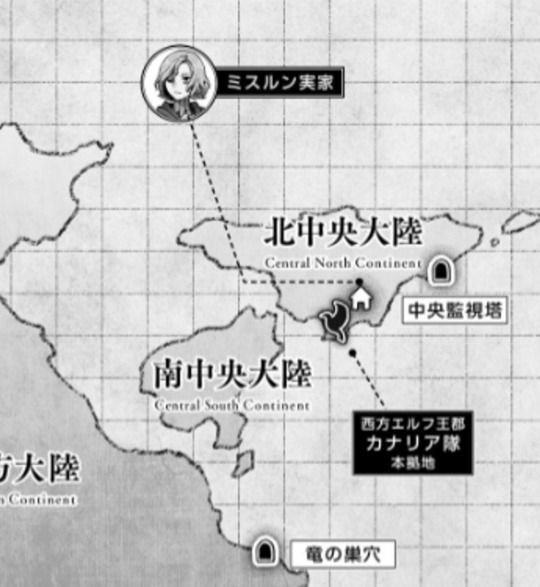
These nations are where all the elves in the story except Marcille and Thistle are from. This post collects all the information I could find about these two nations, and included a bit of analysis based on that information.
TL;DR (includes both fact and my speculation):
The Northern Central Continent is a feudal monarchy with a strong class system, as well as strict borders, & could probably be considered an ethnostate. It's deeply hierarchical, and the queen is a traditionalist - so it's probably very structurally biased against non-elves and half-elves.
Elves in the NCC practice cannibalism in some rural areas!
The Southern Central Continent is more diverse, with a large tallman population on its South Coast.
To elves, "Court Magicians" exclusively refer to those serving the elven queen - a prestigious role that seems likely to be only open to nobles.
The SCC may not be a monarchy, though it's not clear what kind of leadership or societal structure it does have.
The NCC will habitually take anyone involved in ancient magic as a criminal to prosecute on their terms, regardless of jurisdiction, but this depends on their political influence and ability to pressure local leaders to agree to extradite the criminal.
Elves VS Dwarves and Gnomes may have been at war around the time of the Golden Kingdom being sealed. This conflict also may be one of the factors pushing the kingdom to be sealed in the first place.
The "Central Region" might be the origin of the "Common Tongue" that our characters speak.
Northern Central Continent
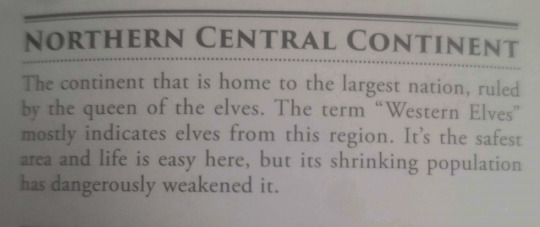
The Adventurer's Bible | p. 132
For this place to have a high quality of life, and also a declining population - especially when it's so close to the Western Continent, which is stated to have poor quality of life - there must be strictly maintained borders and a strong anti-immigration policy. Based on the attitude of the elves, I wouldn't be surprised if it was very difficult to move there unless you are also an elf.
It could probably be considered an ethnostate - and while in these kinds of fantasy worlds, that's pretty common. Take Rivendell, or Moria, in LOTR - they take for granted that these kinds of different fantasy races will live in separate communities.
But that isn't actually realistic, and I think Kui has considered it as more of a politically established status quo rather than an obvious natural result of having magically distinct "races". Which, even in Dunmeshi, I think is a difficult and not-terribly-accurate way to represent politics - racism does not emerge from actual, physical differences between races, after all.
But Dunmeshi's presentation of this idea is interesting, because of the recognition that if there is an "elven nation" which prioritises the interests and rights of elves over other races, that is because there's a deliberate, concerted effort to keep it that way.
But there's a small section of the NCC with a high tallman population - I wonder what kind of community they have, and how they fit into the strict elven hierarchy?
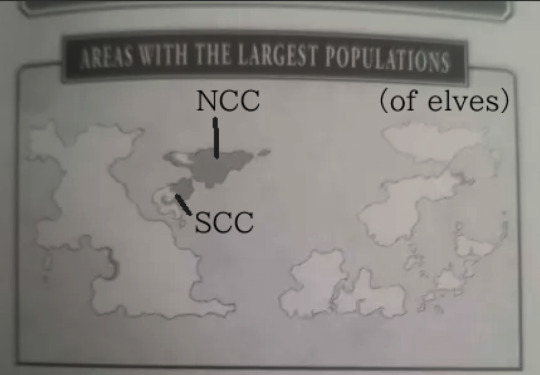

The Adventurer's Bible | pp. 134 & 136
Kabru and Rin, and other kids like them, who are adopted or taken as adopted children(rarely - the way Milsiril treats Kabru is not perfect, but she's deliberately attempting to be better than other elves.... meaning other elves are usually worse)/pets/objects by elven nobles, as well as accomplished or notable individuals who earn the elves' favour/are "invited" to stay (such as they try with Laios at the end of the story) would be an exception.
Other long-lived races could probably (...?) visit, but given the historical conflict between elves, dwarves, and gnomes, I think they'd also be pretty hostile to many of them coming to live on the NCC, even if they see them as more like equals.
Social Structure & Nobility
The Northern Central Continent is an absolute monarchy under a 372 year old queen, Heimeya (IDK what the official romanisation of her name will be).
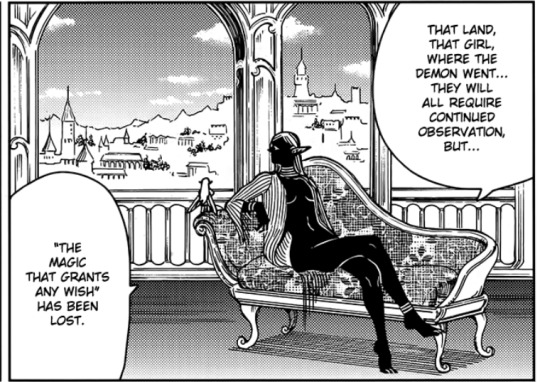
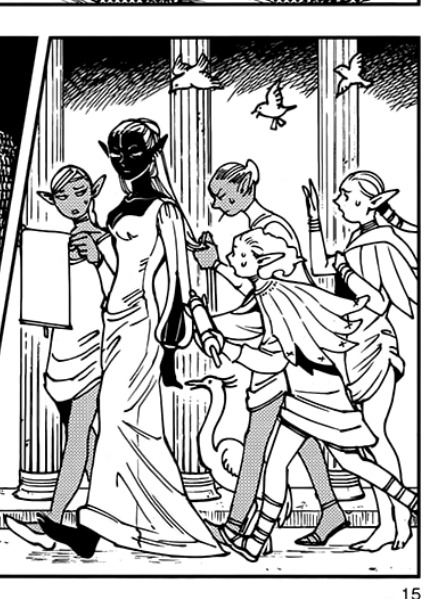
...With extended "nobility", which are the group that the canaries' guards draw from. We don't get much clarification of what sort of structure their nobility has, what titles there are, and where our characters who are nobles fall into it.
Pattadol (House of Vari), Mithrun (House of Kerensil), and Milsiril (House of Tol) are nobles.
Mithrun's noble house, Kerensil, is apparently a well-known family of investors! I wonder what sorts of businesses they invest in & what the elven economy is like?
Milsiril's house, on the other hand, is a well-known military family. I wonder if Kabru could claim the surname "of the House of Tol". He did go to family gatherings after all. But if he was comfortable doing so and it would be accepted, I would assume he'd have done so when introducing himself to the canaries.
Flamela is a distant relative of the queen, who has additional status due to exhibiting the genetic trait associated with their queens, extremely dark skin.
The queen is a "staunch traditionalist" who wouldn't even acknowledge a half-elf like Marcille. Nice! I really feel bad for Kabru and Rin growing up as tallmen in this sort of culture.
Court Magicians
While generally this is a term for any magic user who serves in a royal court, in the Northern Central Continent it seems to carry a lot of esteem; even just as the daughter of one, Pattadol assumes Marcille has the right to boss her around and to handle highly secret, highly illegal ancient magic secrets.
That makes sense, as in the society of the Northern Central Continent, you'd be directly serving the elven queen. But also, she has enough Court Magicians that Pattadol would not expect to know Marcille's mother's name, but few enough that it would be a big deal and Cithis would know about it if one had a half-elf child.
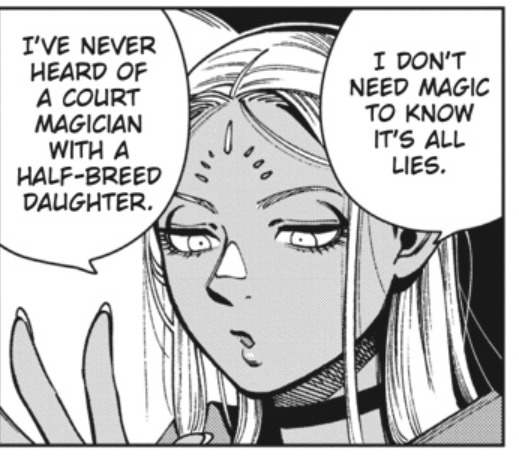
I don't think it's remotely unlikely based on that to assume that this role is only available to nobles.
A "Court Magician" who doesn't serve the NCC Queen isn't a "real" Court Magician in the eyes of NCC elves. Those short-lived monarchs would be happy just to have an elf around regardless of whether they were actually any good at magic.... according to Cithis.
Magic seems very important to the society of the NCC elves. The queen communicates with her subordinates via familar, and the birds we see surrounding her seem like they are some kind of magic - perhaps not familiars since we see her familiar, but some other kind of scrying?
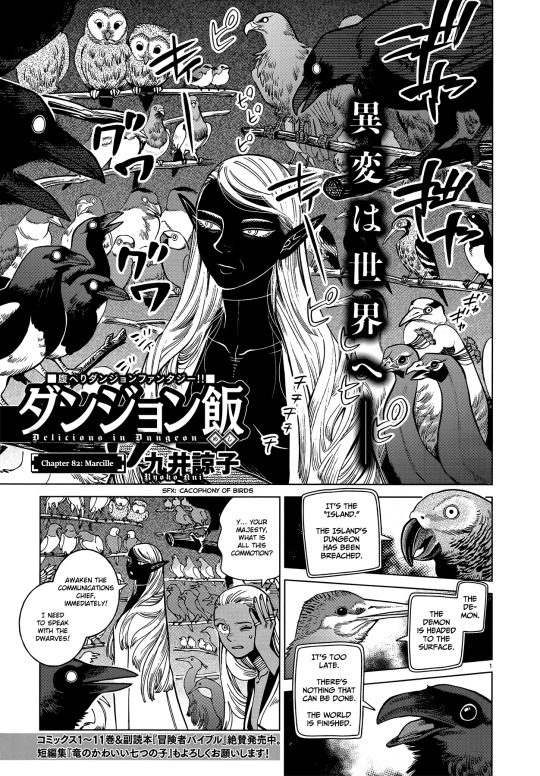
Also, based on the fact Pattadol assumes a Court Magician would be serving the Queen of the NCC, we can theorise that perhaps whatever structure the SCC has, it isn't a monarchy....? Heimeya is "the queen of the elves", after all - that doesn't sound like there's another elven monarch competing for the title just next door.
Ordinary People
Apparently the NCC is a safe place and life is easy -- but given the strict class system, I kind of expect that varies a lot depending on the family you're born into.
The only elves we meet who are not nobles are the convicted criminal canaries, so it's hard to get a sense of what life is like for them from that. Cithis was apparently a wealthy fortune teller with "an intense jealousy for those born noble or wealthy." So I assume she was not born into comfort.
Apparently "There are also primitive villages deep in the woods and underground, and in some regions cannibalism is still practiced." Which is awesome. Based on her videogame elves art I think Kui's probably making a little nod to Divinity: Original Sin elves, who can absorb memories through eating the flesh of others. Elves in dungeon meshi don't have this trait, but I wonder if there is a magical ritual or some kind of cultural practice with a similar intention.
Cuisine
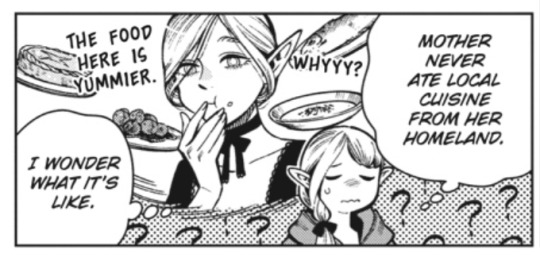
Marcille's mother didn't think much of the elven cuisine.
Liricmumwarel is fancy candy given out by the elven queen the shape of which conveys blessings.
Elf Cake is a crumbly dry cake that Kabru and Thistle don't think much of. I've heard someone discuss what it's likely to be made of, but I am afraid I don't recall.
Southern Central Continent
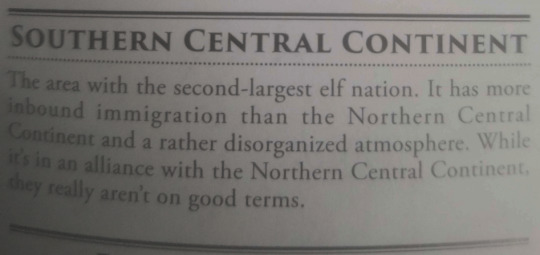
The Adventurer's Bible | p. 132
It seems like the Southern Central Continent gets a lot more immigration and has a more diverse population, especially along the south coast (near the Western Continent). That south coast has a high tallman population.
Fleki and Lycion are from the Southern Central Continent. Fleki got into ancient magic for the money, so you can assume there's probably class disparity there too; things are noted by Kui to be more "disorganised" than the NCC. Not a bad thing at all - the NCC is definitely too "organised" in my books. But that does potentially also mean there's less, e.g., bureaucracy, central organisation, less of a social safety net. But then again, in the NCC I doubt that whatever "safety net" there is, is available to everyone.
We can't extrapolate much from Fleki & Lycion's personalities, because they clearly aren't in the most stable societal position, and I get the sense that they're the countercultural type - they probably don't represent the type of person typical to the SCC. Also, our NCC characters are all either nobles or used to navigating high society (Cithis, Kabru to an extent) so they aren't exactly a typical "ordinary NCC person" as a basis for comparison either. However, there's less of a "strict set of social rules" type of feel to the SCC characters, fitting with my suggestion that the SCC may not be a society with a strong feudal element.
Geopolitics & Conflict
The fact that, despite their being from the SCC, Fleki and Lycion are in the Canaries, who work directly under the NCC's Queen, implies that the the NCC feel entitled to process and prosecute people who commit ancient magic-related crimes regardless of any notion of "jurisdiction". This is backed up by the way that they were going to take Marcille - but that is something that the governor of the Island had to give permission for, which Laios is able to withdraw. So I assume that the NCC elves apply pressure on various world leaders to extradite criminals involved in ancient magic.
The SCC would cooperate with this, since they're allies, even if they don't have a great relationship (according to the World Guide).
The NCC are also clearly able to take half-foots without trouble, as we see by Chilchuck saying he's known half-foots who got involved with "black magic" (ancient magic) and were disappeared by the elves. But I doubt gnomes or dwarves are giving people up easily - though that probably doesn't go for dwarves like Senshi and Namari, without strong community ties.
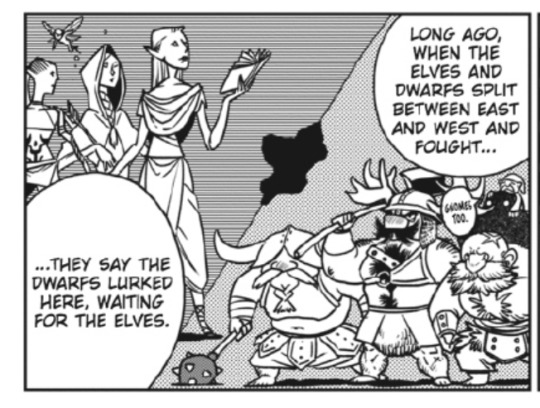
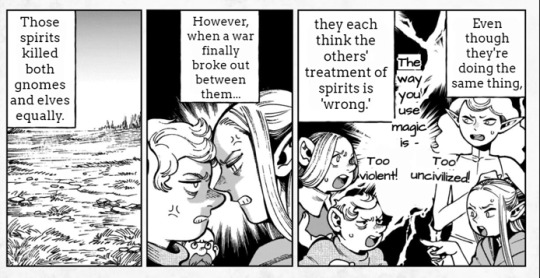
Long before the current times, elves fought dwarves & gnomes. There might have been more than one of these conflicts...? While long ago, this war isn't "ancient" (like the ancients who sealed the demon into dungeons, before their world was mostly destroyed by it).
Thistle, Delgal, and the Golden Kingdom were (I believe) caught up in one of these conflicts, which used Melini as a staging ground - thus why Thistle was pushed to seal the entire kingdom in the dungeon.
To do this, Thistle unseals a dungeon created by the "ancient people". These could be the "ancients" who created the dungeons, before the apocalypse. Or they could be another, still extinct, society.
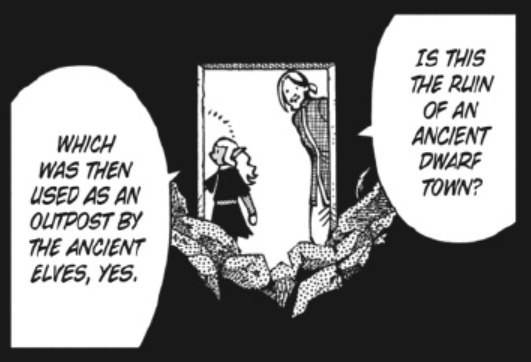
Regardless, at least one of these conflicts seems to have taken place after the golden kingdom was sealed - so, within the last 1000 years.
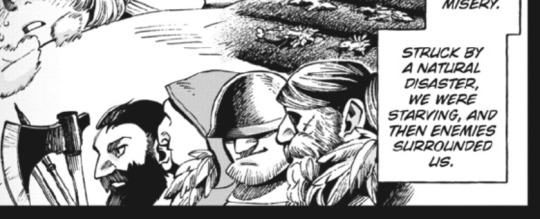
Though, this could refer to a different, more localised conflict between the Golden Kingdom and their dwarven neighbours.
The order of events is that the Golden Kingdom was sealed (1000 years ago or so) > Dwarves took over > Elves stole the land from the Dwarves ("long ago" by the Island Lord, a tallman's, standards) > Elves gave the land to a local lord, who was either an ancestor of the Island Lord, or the Island Lord himself. The Island Lord is himself a descendant of the lord who poisoned Delgal's father, as is noted in the World Guide. However, it isn't impossible for there to be large gaps of time between these events, which could put the elf / dwarf wars at a more recent date.
The fact we know that the elves stole the land from the dwarves, and then granted it to a political actor who was relevant during the events of the Golden Kingdom flashbacks we see suggests to me that the events were roughly contemporaneous. If they were, that puts at least one of these conflicts at roughly 1000 years ago.
So, the elf/dwarf & gnome conflict is "long ago" by short-lived standards, but would be considered "modern" by the long-lived races, if you ask me. At least, the equivalent of the World Wars for us - recent history, even if we weren't alive.
I'm guessing the "Elf King" from the below panel in fact was a word that's more gender-neutral in Japanese, since the "Western Elves" definitely have a queen.
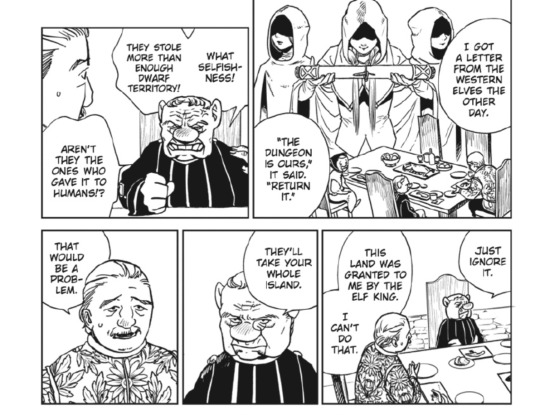
Language
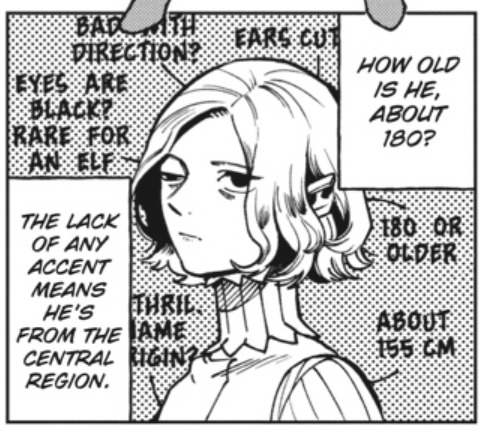
When Kabru says the "Central region" I expect he means the region where the NCC and SCC is.
The fact that he observes that the lack of any accent means he's from the Central Region is really interesting. It could mean two things;
either they switched to speaking in the language spoken on those continents, which Kabru would naturally know, having grown up there. It's 100 percent possible, but I think this would be noted in the story.
or, the language that gets called "the common tongue", the one that all our principle characters speak for most of the story, originated from the elves in the Central Continent. Or at least it's the same one that the elves use, and their political influence is great enough that their accent gets to be considered not an accent at all. The fact they were "granting" land in this area to tall-man lords suggests a large enough historical influence in the area that this is quite plausible to me.
Mithrun absolutely does have an accent - nobody speaks without an accent. His accent is just politically and socioculturally normalised to the point of being considered the "default/proper" way to speak - like received pronounciation in English.
The common tongue isn't ubiquitous everywhere - not just Kuro, but Kiki and Kaka are also noted to be studying the common tongue. The Tansus were born on the Eastern Continent, so probably gnome communities there speak their own language - Kiki and Kaka grew up primarily surrounded by gnomes after all.
It's also quite likely that Kabru, specifically, because of where he grew up, would consider Mithrun's way of talking to be the default "not an accent" accent. His adoptive mother surely has the same upper-class NCC accent. I expect that other characters might experience it as more "marked".
This isn't a world where everyone speaks the same language everywhere; the common tongue is called that, but there are many different languages. Kabru and Chilchuck are two characters who are adept with many of them - Kabru speaks the language of the kobold, and probably lots more. Chilchuck works as an interpreter as part of his union stuff - I can tell you from experience that that's a hugely valuable skillset in that context, as many of the people who most need union representation are people who don't speak the dominant language, or at least not fluently.
If you got all the way to the end of this post.... thank you for reading, I love you. Check out my other World Map Notes under that tag on my blog; I've made a few so far and there will almost certainly be more. Next I'm thinking the dwarven nations...? But I could be persuaded if someone had a preference.
Also, anyone got any speculation on what, exactly, is the previous time that Heimeya ate a person/monster/chimera that this panel implies:

We really don't have anything to go on whatsoever, but I think it's a fun tidbit.
#og post#dungeon meshi manga spoilers#dungeon meshi meta#dunmeshi#dungeon meshi analysis#delicious in dungeon spoilers#dunmeshi spoilers#delicious in dungeon#dunmeshi meta#the canaries#milsiril#mithrun#kabru of utaya#i feel sooooooo sane to have made this. but it has some super interesting details imo#colour coding only on the TLDR just cause I dont want ppl to take my theories as fact#character info I drop without a panel comes from the world bible#world map notes
339 notes
·
View notes
Note
hi!! do you have anything interesting on gnomes? i feel like we're given very little on them besides asides bc none of the major characters are gnomes
Yes! I compiled a Gnome post not long ago with some interesting things.
It's also canon that people confuse them with dwarves because they live close to each other and look alike

"Gnome populations are seen on the Eastern and Southern continents, and in the eastern area of the Western continent. Other races tend to confuse them with dwarfs. The two races also tend to live in areas that border each other."
Here's ones I forgot to add to the post, healer clothing is based on gnome religion. (the one I assume Holm is part of)


Another fun fact is that it's canon that gnomes just take it easy, it's mentioned in Kaka & Kiki page that they're so chill because they live among gnomes

Tansu is the exception I guess

222 notes
·
View notes
Note
Sorry if you’ve already answered this, I’m having trouble finding different posts in your blog.
I know a lot of your asks are more practical-related, but how do you suggest fully encapsulating the horror and tragedy of war in a (fantasy) battle scene? I really need that emotional and gory impact but it also to seem reasonably realistic.
My favourite references are Battle of the Bastards in GoT and scenes from Lord of the Rings.
Thanks!!
Martin and Tolkien are not two authors I’d ever expect to find together when discussing thematic and abstract concepts like the horrors of war in their writing. One of them is extremely deep, and the other is a puddle. Neither of them are particularly “realistic” but only one of them claims that pretense while drawing from real history. If you’re wanting horrors of war, you’re much better off moving away from Martin and taking a gander at the actual War of the Roses.
Let me explain.
Tolkien served as an officer during World War I. By sheer body count, The Great War was one of the most bloody and brutal wars in human history. As a point of reference, over a million soldiers died during the Battle of Somme. Perhaps as importantly, World War I killed the cultural concept of the Summer War. Before World War I, the British upper class viewed war as a game. War was an adventure, something young men did between reaching manhood and getting married. Watson from Sherlock Holmes is an excellent example of the end result for this particular outlook. They figured they’d go off, have some jolly good fun, get a few scars, and be back in a few weeks in time for tea. What they got was a meat grinder. Two of Tolkien’s close friends died during the war. He also lived through the bombings during World War II while working as a professor at Oxford, he experienced the devastating effects that war had on the civilian population first hand, and, likely, saw a few of his students die. Despite his hatred of allegory, the man was working through some shit in The Lord of the Rings.
If you’re interested in learning more about World War I or even about effectively demonstrating the horrors of war, I do recommend reading All Quiet on the Western Front. I read it once in high school (more years ago than I’d like to admit here) and, much like Elie Wiesel, it has stuck with me. It was also such an effective anti-war novel the Nazis banned it and it was one of the first books they publicly burnt, so you know it’s good.
Back to Tolkien.
What they don’t tell you about fantasy is that it’s real life, just with elves and dwarves and magic. The real world forms the foundation of fantasy and it’s the humanity of the emotional experience in war, the good and the bad, with both ends cranked all the way to eleven that really makes Tolkien’s work so impactful. LOTR is operatic by design, but what keeps the narrative from falling into melodrama is the core thematic message underneath the pageantry. One of the major themes is hope, which gets symbolized in light, and hope’s interplay with despair, symbolized in darkness. Not just a rosy view of it either, but the genuine struggle to keep the light burning against all the overwhelming reasons to give up or give in. Tolkien allows his characters to be corrupted and redeemed, their struggle with temptation before ultimately choosing the better path or failing and falling into darkness. He commits to the idea that hope can be restored in the unlikeliest of places.
Boromir’s death is, perhaps, one of the best examples of Tolkien’s philosophy in action. Boromir is a character we’re not sure of, he wants the one ring from the outset, he’s the only one advocating that it shouldn’t be destroyed. The hearts of men are easily corrupted. When he tries to take the ring from Frodo, he falls into his worst instincts and breaks the Fellowship. But then, against the overwhelming flood of Uruk-hai, Boromir tries to save Merry and Pippin. He fights wounded, shot again, and again, until he’s felled by twenty arrows and he fails. Yet, in his failure he restores Aragorn’s hope in his people, gives him a reason to fight for Gondor, and inspires the audience to believe in Man’s potential for greatness.
Tolkien could have left Boromir in the dark, but he didn’t. He could’ve given into cynicism, but he didn’t. In every adaptation, Boromir’s death never fails to get me bawling. Boromir is both good and bad, both dark and light, his best and worst instincts are driven by the same underlying, sympathetic reason—his desire to save his people and fulfill his duty to his father.
On the whole, I find Tolkien’s presentation of the human condition and war to be more compelling and realistic than Martin’s. Tolkien’s underlying themes have more in common with All Quiet on the Western Front, Saving Private Ryan, and HBO’s Band of Brothers. For all that his characters often feel larger than life (by design, he’s telling an epic) there’s always a grounding quality that allows the audience to connect with them. Whether we agree with Tolkien’s core thematic message or not, Tolkien genuinely has something to say about warfare and its effect, both on personal and world changing levels, and he communicates that message very well.
The irony about the “horrors of war” isn’t about the horrors of war. Thematically, the “horrors of war” is about who we choose to become in the face of them when trapped in the crucible. Do we rise to our best selves? Do we fall to our worst? When every illusion about who we believe we are is stripped away, what’s left? It’s an existential question, not a “realistic” one.
You can’t write about the horrors of war in fiction if you have nothing to say about war, humanity, and its effects. All you’ll end up with is gore for shock value. The world becomes hopelessly depressing, and, in the end, all the blood turns brown before it’s finally shat out.
Hi, Martin.
Don’t get me wrong, Martin is a very skilled writer. His prose is genuinely beautiful and his first book in ASOF, A Game of Thrones is actually a pretty decent deconstruction in the traditional fantasy narrative and a fairly realistic treatment of how events would go for the standard well-meaning fantasy protagonist. And that’s… the deepest we get.
Martin comes out of the 24/Joss Whedon death for shock value school of writing and the land of Iron Age comics that doesn’t have anything to really say beyond, “people suck.” Underneath it all is a level of cynicism in the human condition that would make Garth Ennis blush. The deaths are just shock value. There’s nothing more to it than that. Once you’ve acclimated to the gore, there’s nowhere else to go and nothing else to think about. Ironically, out of his contemporaries, Robert Jordan is better at giving both war and death in his narrative lasting effect, driving character growth, and real meaning.
Martin and Tolkien are opposite ends of the spectrum in their approach to war and their outlooks are utterly incompatible. One of them is a complete cynic and the other is facing himself honestly, openly, fearlessly, and without a smidgen of irony. (The true irony here is that the latter is the Englishman.) Following Martin’s blueprint won’t bring you to a Tolkien outcome. Tolkien’s genuine emotion is the subject of mockery in Martin’s world. Season 8 may’ve been clumsy and infuriating, but it was the natural end of Comic Book Iron Age cynicism. There are no good people, people with power can never be trusted, and all heroes, no matter how noble, reveal their true colors as villains in the end. As Christopher Nolan said, “You either die a hero or live long enough to become a villain.” This philosophical outlook may be sold as realistic but it’s really just Political Both Sidesism, Fantasy Edition.
The irony is that the real history Martin draws from, The War of the Roses, is simultaneously crueler, kinder, more noble, more horrific, more impactful, and ultimately more hopeful than Martin’s own work. And this was post the Hundred Years War and all the wars that preceded it.
I bring you, the Duality of Man.
If you want to write a realistic battle scene, start with real war. If you want to write about the horrors of war, start with real war. Pick a war, any war, and dig in. Reading the experiences of others is a way to gain insight into experiences you yourself don’t share and start to process the different philosophies born out of those experiences. The horror of war is a human one.
The most important lesson is that you won’t get there by focusing on the battle itself. To truly feel the impact, every character needs to be carefully built from the very beginning with a through line to every horrific event that happens to them. If you want to learn how to do that, then you need to go study every single war movie from good to bad (including the jingoistic rah-rah ones) like Apocalypse Now, Saving Private Ryan, Battle for Iwo Jima, etc, to really start internalizing the underlying storytelling structure and character design formula that makes those films tick. There’s no one better at portraying the horror and humanity of war than the war film industry. Part of what makes the best of these films really good is their willingness to allow their characters to be emotional and vulnerable. Which you won’t find in a lot of fantasy novels that run on machismo, but is the secret sauce that gives Tolkien his impact.
Having the confidence to allow your characters to struggle, be vulnerable, experience humiliating circumstances, and appear weak is an aspect of writing that a lot of men and women struggle with. Cynicism is a form of self-protection to keep those emotions away, to keep one from being emotionally invested, and is a means by which we protect ourselves from being hurt. We may portray cynicism as the more realistic reality but it’s just a cloak we hide behind. Martin’s approach to warfare is less realistic than Tolkien’s. Tolkien’s characters approach warfare with an eye toward protecting their civilians, safeguarding their future, or, in the case of his villains, focus on genocide. War for Tolkien is the eradication of civilization and the destruction of the future. Characters from experienced combatants to innocent civilians are willing to risk their lives for a world and for the people who matter to them. Martin has the Summer War. It’s there in the title, A Game of Thrones. An entertaining charade of musical chairs. And while all of his characters are chasing power, almost none of them have any sort of vision or goal for the future beyond the accumulation of more. In Martin’s world, the only way to truly win is not to play, but in the real world playing is the only way to create the world you want. Cynicism ends with no seats at the table and no means to change or save anything.
It’s funny because England during the War of the Roses had been in a state of near constant warfare for hundreds of years with their own domestic powers and France prior to the War of the Roses kicking off. The concept of a Summer War didn’t really exist for the medieval nobility. Much as we joke today about war being a game for medieval nobles due to their ransom protections, it really wasn’t. The peasantry was also much, much more dangerous en masse than they are in ASOF. They drove traveling monarchs to hide in monasteries plenty of times and, while that’s funny, it’s not actually a joke.
Now, picture Joffrey dragged off his horse in the middle of a riot and having his skull crushed by a local fishwife right before being trampled into a bloody, unrecognizable pulp by sharp hooves.
Or enjoying the Agincourt bathing route.
You’re welcome.
-Michi
This blog is supported through Patreon. Patrons get early access to new posts, and direct access to us through Discord. If you’d like to support us, please consider becoming a Patron.
1K notes
·
View notes
Text
the amazon tolkien show was already pretty bad for a number of writing, characterisation, and thematic reasons, and profoundly mid the rest of the time.
then, in the last few weeks they proceeded to publish a magazine cover with barrow wights that are an orientalist caricature that looks like it came out of pre "don't dress up as sexy cleopatra for halloween" discourse. it's cursed wraiths bedecked in coin jewellery, sporting a belly-dancer outfit that is not sexy just because they're undead. that of course birthed the most insanely stupid discourse you can imagine. on one hand having the racists bemoan that the anglo-saxon-inspired burial sites magically transformed into middle-eastern-looking monsters because of woke. on the other hand, the "akshually the lore" people, trying to prove that, in the second age, these humans might well have been remnants of those who came from the east and not the shire-adjacent barrow wights we're all acquainted with, so, gotcha racists! par for the course for insanely stupid tolkien discourse. the point, as usual, being that it doesn't matter whether it's possible by lore. rather, what if we look at the reason why, in this day and age, a magazine SO ironically called "empire" puts on the front page the first glimpse of aesthetics/concept art that are markedly not western, and that art showcases a known orientalist look that doesn't even get the dubious dignity of being put on people and is instead sported by undead monsters? diversity win!
then yesterday they dropped a narvi look and a dwarf poster. we already knew they barely moved past the scottish dwarf stereotype set by peter jackson, a director with whom this series is continually in conversation. we already knew the prosthetic noses of the dwarves in the hobbit movies were silly at best. yet again, narvi is given a fake nose of such proportions that you might think he was about to play cyrano de bergerac. and then there's the poster, where a ring with a giant gem glinting gold in the foreground, in the company of the other rings, stands against a darkened background where a shadowy dwarf grasps forward with clawing, avid hands. of course, after doing some orientalism, it's time to throw some antisemitism in and make sure to hit every box in the bingo. if that poster hadn't appeared on the official account, I'd have thought it a parody.
I've never posted about the show because as a rule I don't feel like wasting too much time on things I think are bad. I sure hope I never will again. I'm also not looking forward to the next bit of corporate diversity we'll certainly be graced with soon enough.
86 notes
·
View notes
Text
Happy June!
To celebrate the fact that we are now officially one month away from the start of AU Roulette, have a post detailing the 36 AUs included in this year's challenge -- or don't, if you'd rather be surprised.
This year's AUs have been curated to be intentionally broad, in the hopes that they will encourage unique takes on each prompt and the creativity of the authors participating. You are welcome to write anything that falls under the umbrella of your assigned AUs, whether it's an original universe, a fusion inspired by another fandom, or something else entirely.
(What's AU Roulette, some of you might be asking? An explanation can be found here, along with the link to sign-up!)
Without further ado -- the AU list, under a cut:
Roleswap - Maybe you want to switch two characters' places, do a class-swap for a D&D fandom, try your hand at an age-swap fic, or you have another idea.
Superhero -- Invent an original universe or do a fusion with one of the many popular big-screen superhero stories. Play it straight and give your favorite characters cool powers, or try a deconstruction of the genre. With great AUs comes great responsibility
Gothic Horror -- Castles. Ghosts. Vampires. Drama. Love that conquers Death. Take your inspiration from classic literature or a newer entry in the genre, like The Locked Tomb books. But be sure to make things spooky.
Post-Apocalypse -- Will the world end in fire or in ice? Or maybe economic collapse, war, zombies, or one of many other options? You write what happens next!
Fairy-Tale -- Pick a classic tale from the Grimms, Hans Christian Andersen, Asbjørnsen & Moe, Charles Perrault, or another favorite author to inspire your AU, try out a more modern re-telling, or use fairy-tale elements to craft your own story.
High Seas -- Including but not limited to Pirate AUs and other Age of Sail adventures. Try out something more historical, or throw in as many fantasy elements as you'd like -- or a bit of both.
Time Travel -- For fixing mistakes, making things worse, or time loops. Or maybe you want to write a fusion inspired by a piece of popular time travel media, like Doctor Who.
Western -- Another AU where writers are free to do their history research or to lean into more outlandish genre conventions. Cowboys, cowgirls, and cowpokes all welcome, of course.
Mythology -- Write a story inspired by your favorite myths and legends, from a whole host of different cultures. Or maybe you'd like to try your hand at writing some epic poetry?
Coffee Shop -- A classic everyone knows and has strong feelings about. Play it straight or add a twist, whichever suits your fancy! After all, no one said where the coffee shop has to be...
College/Academia -- Are the characters in your AU students? Professors? Weary adjuncts? Throwing hands at a conference? Some mix of the above?
Theater -- Put those characters on Broadway or cast them in a disaster of a community theater production. Or a school play! All that really matters is the show must go on.
Ghost/Cryptid Hunters -- Maybe you want to write a story starring the next Scooby-Doo crew, or maybe there really is something strange in the neighborhood. Or maybe it'll never be clear what really happened -- it's your choice!
Secret Agent -- Code words, code names, you name it. Write a story about spies, cryptographers, or any other clandestine operators. Take inspiration from history or from James Bond. Just don't spill your secrets too soon.
Detective -- Whether you're writing the world's greatest detective or someone who just can't get a clue, play up the mystery! Use a classic locale like 221B Baker Street or invent your own.
Cyberpunk -- Time to write cyborg identity crises and fight the machine (literally)! Take inspiration from classic media like Neuromancer or Blade Runner or make a totally new cyberpunk universe of your own creation.
High Fantasy -- Elves and dwarves and gnomes, oh my! This AU could encompass everything from Middle Earth to D&D AUs to your favorite high fantasy books you read over and over as a kid. Or maybe you have your own spell to weave.
Band/Musicians -- Whether you decide to make the characters in your AU famous pop stars, part of an orchestra, students at a conservatory, jamming together in their garage, or otherwise musically-inclined, have fun with it!
Reporter/Journalist -- For everything from local anchors and newspaper staff to big-league investigative reporters. Write characters who'll do anything to get a scoop or with a strong sense of justice -- it's your call!
Cosmic Horror -- You don't have to love Lovecraft to get creative with this AU. Make characters comprehend the incomprehensible, send them messages from beyond the stars, and get a little creepy.
Heist -- Will you write a story about master thieves? Vigilantes righting some wrong? What's being stolen and why? Try a Leverage AU or a caper of your own making.
Space Opera -- The genre encompassing works like The Expanse, Imperial Radch, Mass Effect, and Star Wars, brimming with galactic empires, alien species, and chivalric adventures. Write a fusion set in the universe of your favorite work in the genre, or invent a new one!
Sports/Athletics -- Pick a sport, any sport -- whether a team game like hockey, an individual one like archery, a paired one like figure skating, or something a little unconventional, like roller derby or HEMA. Then it's ready, set, write!
Historical Era -- An AU type absolutely bursting with potential, from medieval romances to 1920s Prohibition AUs, to ones inspired by historical fiction like Les Miserables. Whatever era of history strikes your fancy, you can write it.
Road Trip -- Pack your favorite characters in a car and don't forget the snacks. Or maybe the spaceship, or something else if you're feeling adventurous. Where are they headed and why? Only you know the answer!
Space Exploration -- Whether you want to write modern-day astronauts, a futuristic Star Trek AU, or something inspired by the space race, the sky isn't even the limit with this AU.
Urban Fantasy -- For all your modern-with-magic settings. Write an AU inspired by something like Teen Wolf, Artemis Fowl, Buffy the Vampire Slayer, or much of Neil Gaiman's oeuvre, or invent your own world where witches and websites coexist.
Museum/Archives -- Have the characters in your AU working in the exhibits or behind the scenes, down in the collections or even as archaeologists or paleontologists. What secrets are waiting to be unearthed there?
Hospital -- A surprisingly flexible AU option -- are the characters working there, or the victims of some unfortunate accident? Or maybe it's a bit of both. Take it wherever you feel like.
Camping/Wilderness Survival -- Could be anything from a fun summer camp or camping trip to a nightmare survival scenario. Write everyone having s'mores around the campfire or something inspired by media like Yellowjackets, where they might be having... something else.
Steampunk -- A fantastic opportunity to get creative with your worldbuilding. Try your hand at some alternate history, or invent a world of airships and other flying machines of your very own.
Shapeshifter -- Can the characters in this AU turn into anything they want? Or maybe they're more limited, like selkies -- even unable to control their shapeshifting at all (can I get an "awoo" from the werewolf fans?)
Classic Literature -- An AU somewhat more dependent on fusion ideas, but still very flexible! Pick a favorite classic book or play and let it inspire your writing!
Dystopian -- Create your own awful society or let a favorite piece of media guide you, like writing a Hunger Games AU. Will the characters break the cycle, or end up trapped in it?
Renaissance Faire -- A recipe for chaos. Write a bunch or faire-goers or have the characters in your AU working at the faire! Adventures await.
Scientist/Mad Science -- Write characters as normal biologists, physicists, and chemists, the next Frankenstein, or as hapless experiments themselves!
120 notes
·
View notes
Text
Naming Systems
For the humans and tieflings of Baldur's Gate
(and half-orcs and half-elves who follow human naming systems rather than that of their non-human culture)
Dwarves, elves and others will be done another time to save space.
Obviously I imagine you've all named your Tavs and Durges by now, but idk, I felt like doing this and maybe you've got random background OCs to name.
Sometimes people like to name their kids after gods. Like "Helm" and "Torm".
Chondathan
By far the most common names and surnames in Baldur's Gate (including non-human names).
Quite often people have no official surnames and use locations and vocations as surnames, like in real life (Blackgate, Cliffgate, Tumbledown, Tailor, Gardner)
Families of Cormyrean descent usually favour portmanteau surnames: Evenwood, Breakwood, Ironwinter, Summergate, Amblecrown, etc.
Residents of the Dalelands who move abroad often use the name of their Dale and shorten it. For example, Barantra from Tasseldale upon moving to Baldur's Gate would call herself "Barantra Tassel" and her descendants might continue to use that as a surname.
Dales: Archen, Scar, Tassel, Deeping, Harrow, Battle, Feather, High, Mistle, Shadow, Moon*, Sessren*, Tarkhal*, Teshen*, Dagger, Merry*
*These dales have fallen to history. In the case of Merrydale, the name was changed to Daggerdale after an incident involving a brutal vampire infestation that led to a lot of violence and made everybody suspicious and hostile, so these surnames would indicate it's been a long time since your ancestors left the Dalelands.
Sembian families like to invent newer and grander surnames, in an attempt to make themselves look rich and important. This is less likely to be seen in the Western Heartlands, but I suppose it still may occur. Families often hyphenate their names so you might meet "Shandri Clarandal-Tarlroyal", or "Roakyn Dauncrown-Sardar"
-
Canon common given names:
Masculine: Darvin, Dorn, Evendur, Gorstag, Grim, Helm, Malark, Morn, Randal, Stedd.
Feminine: Arveene, Esvele, Jhessail, Kerri, Lureene, Miri, Rowan, Shandri, Tessele.
(Plus a few dozen more I'm not typing out)
While the following isn't exactly canon I feel like you can get a name that "sounds about right" by breaking the syllables down and shoving on a syllable that goes on the end.
Like with the names "Lureene" and "Arveene", the ending is "eene" and you get the syllables "Lur" and "Arv".
Then you could get new names by taking, idk, "Kerri" and "Miri". Ker+ri, Mi+ri = Lurri and Kereene and Arvri. Mieene doesn't really sound right, but idk.
Syllables
Dar, Dor, D, Even, Gor, Gors, Gr, Mal, M, Rand, Ran, St, S, Arv, Esv, Jhes, Ker, Shand, Bev, Tes, Al, Ald, Alvae, And, Gal, Galag, Cath, Coran, Bold, Bol, Elbas, Ind, Jath, Ont, Prend, Baran, Coel, Dar, Em, Shar, Galiy, Hael, Saldv, Dal, Torv, Varan, Joy, Sar, Pip, Nan, Zor, Nok, Rorn, Far, Soor, Mi
Endings
Masculine: -in, -vin, -orn, -dur, -ur, -tag, -stag, -im, -ark, -al, -dal, -edd, -arl, -rel, -rus, -us, -or, -ion, -stion, -ond, -dor, -yn, -dyn, -yk, -ryk, -ke, -il
Gorion, Darvin, Malryk, Tesor, Jathstag...
Feminine: -eene, -ele, -sail, -ri, -dra, -tra, -ra, -la, -ria, -ara, -arra, -one, -ue, -due, -syl, -ala, -ys, -ae, -naem, -ice, -e
Shandra, Miele, Darla, Arvone, Sarice, Cathtra, Bevra...
-
Alzhedo
The second most common group of names heard in the Gate, although early in the city's history I suspect Calishite and Illuskan names were more common. I note that "Jaheira" is likely an Alzhedo name (which makes sense, she's from Tethyr).
So, Calishite filial piety and subsequent naming standards are very detailed and specific: "A person is worthless without the identity gained by his name and that of his family."
A slave will have their given name and the name of the family that "owns" them. A large part of the population of Baldur's Gate are descended from former slaves, exiles and dissidents of the Calishite Shoon Empire, and would likely have originally borne names under that system.
In this case it's [name] adh [master's surname]
So for example, Hamlil adh Tahandral. It's possible that it Hamlil had migrated northwards with her family that one of her descendants might be Miri Tahandral or something.
A freeman would list their title/s, their given name, their matronym or patronym, their family name, and their home town.
So if your name is Aseid, your father is Haseir, you're of House Dumein and you live in Baldur's Gate then: your full name, in the traditional manner, is "Aseid yn Haseir el Dumein yi Baldur's Gate," while if you have a sister, Ceidil daughter of Atala is called "Ceidil yr Atala el Dumein yi Baldur's Gate."
Adding your hometown onto the end is usually not necessary, and using it all the time is a sign of civic pride.
Diaspora, such as the Baldurians, usually drop the articles.
Aseid Haseir Dumein
Ceidil Atala Dumein.
Aseid may chose to use a matronym, Aseid Atala. This deliberately draws attention to her identity over her husband's which is unusual. It implies that his mother is particularly high ranking or infamous. Likewise Cidil may name herself Ceidil Haseir.
Clergy traditionally replace their family with their god, so if Aseid decides to go to the Rose Portal shrine and take up life in service to Lathander, he will be "Aseid el Lathander" or "Aseid Lathander".
Syllables
As, Am, And, Bard, Has, Khem, Khe, Meh, Sud, Sudei, Zash, At, Ceid, Cei, Ha, Ham, Jah, Jas, Mei, Meil, Seip, Sei, Yash, Bash, Dum, Jas, Khal, Kha, Most, Mos, Pash, Amj, Tah, Tahan, Bhal, Mjo
Endings:
M: -eid, -eir, -ed, -med, -en, -men, -man, -ad, -id, -al, -ein, -an, -ar, -ein, -san, -ir
Amen, Mehsan, Khemad, Zashein...
F: -ala, -edia, -eira, -eda, -il, -a, -ma, -al, -lil, -ida, -eina, -ana, -ara, -eina, -sana, -ira
Jaheira, Bhalil, Yashana, Tahma...
?: -sha
Canon common names:
Masculine: Aseir, Bardeid, Haseid, Khemed, Mehmen, Sudeiman, Zashtir.
Feminine: Atala, Сеidil, Hama, Jasmal, Meilil, Seipora, Yasheira, Zasheida.
Common house names: Dumein, Jasan, Khalid, Mostana, Pashar, Rein.
-
Illuskan
Third most common group.
I can't find much of anything about how naming systems are supposed to work for Illuskans.
Some don't use them at all.
Some go for patronyms and matronyms: -sson and -sdottir, so you get like, Malcersson and Cefreysdottir. These do not seem to be common.
Some surnames are: "Kurth", "Helder", "Rethnor", "Stornar", "Rhuul"... This is entirely headcanon/guessing, but maybe they're patronyms and matronyms with the suffix removed? Luthin Cefreysdottir -> Luthin Cefrey?
Some gain names for themselves, self-bestowed or bestowed by reputation, based on aspects of themselves or their deeds that they're proud of or that give them fame: Nimoar "the Reaver", Ornar "of the Claw".
Most have surnames of some kind, some are portmanteaus: "Tenfeather", "Hornraven", "Windrivver", "Hathwinter", "Brightwood", "Lackman", "Stormwind", "Gnarlybone."
This seems to be the most common form of surname. I'm entirely hypothesising, but Illuskan cultures value bravery and strength (particularly in battle) so I'd assume those are deed-names, possibly inherited from a famous ancestor?
Syllables:
And, Bla, Bl, Br, Fr, G, Lan, Land, L, Mal, Malc, Sto, Tam, Am, Ama, Be, Beth, Ce, Keth, Mar, Ol, Sili, West, Wes, Or, Alas, Aga, Jaun, Von, Oj, Ost. Uth, Nash
Endings:
M: -er, -ath, -ran, -eth, -uth, -der, -or, -an, -nar, -gar
Nasher, Oruth, Landgar, Ander, Vonor, Westran...
F: -frey, -tha, -ra, -ga, -tra, -da, -in, -ya
Agatha, Ojya, Malda, Stoya, Ceda, Luthin...
Canon common names:
Masculine: Ander, Blath, Bran, Frath, Geth, Lander, Luth, Maler, Stor, Taman, Urth.
Feminine: Amafrey, Betha, Cefrey, Kethra, Mara, Olga, Silifrey, Westra.
-
Rashemi (Gur)
The Gur still speak a variant of the proto-Rashemi tongue amongst themselves in private, so depending on how much they assimilate or not I imagine at least some of the names might be similar?
I can find even less about Rashemaar surnames than I can anyone else right now.
Surnames used by Rashemi are: Chergoba, Dyernina, Itazyara, Murnyethara, Stayanoga and Ulmokina. Names like that might be Gur tribe names?
Syllables:
Fyev, Bori, Bor, Faur, Hulm, Hul, Jand, Jan, Im, Kanith, Kani, Kan, Madi, Mad, Nav, Madis, Ralm, Shau, Shaum, Vladis, Vlad, Dyna, Min, Tam, Yul
Endings:
M: -vik, -gar, -ik, -ar, -islak, -ak, -evik, -insk
F: -arra, -mith, -ith, -zel, -el, -dra, -ra, -heir
Canon common names:
Masculine: Borivik, Faurgar, Jandar, Kanithar, Madislak, Ralmevik, Shaumar, Vladislak.
Feminine: Fyevarra, Hulmarra, Immith, Imzel, Navarra, Shevarra, Tammith, Yuldra,
#Today I worked out that Jaheira's name is Alzhedo in origin#Which is a bit obvious in hindsight#...“The Dark Urge yn Bhaal el Bhaal yi Barrens of Doom and Despair” is a legit name#...“Durge Bhaal Bhaal”#Me: “Maybe today I'll talk about how the afterlife works”#Brain: “Nah research fantasy names instead.”#Me: “OK”#lore stuff
117 notes
·
View notes
Note
HI fellow LotR fan!! If all of the characters in the trilogy were snakes, what snakes would (at least some of them, I know there's a lot) they be?
Ooooh that's so fun!
Bilbo and Frodo: ball pythons. They're cute. They're a lil bit shy. It's perfect!

Sam: rosy boa. Vibes are right and there's a flower in the name

Merry and Pippin: western hognoses 10000%
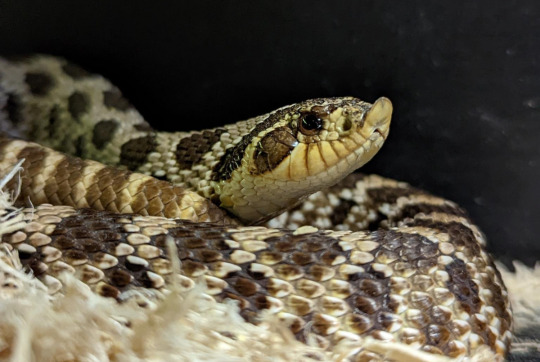
Gandalf: the oldest, scrungliest ratsnake that ever did live
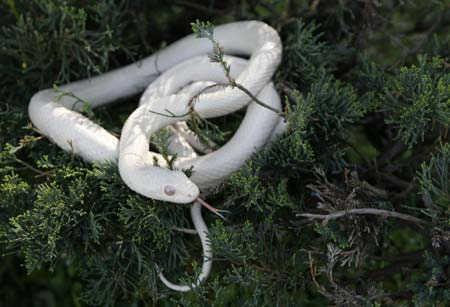
Aragorn: I'm biased because I have a rainbow boa named Aragorn, but rainbow boa

Legolas: Trans-Pecos ratsnake

Gimli: dwarves have rattlesnake vibes. Gimli would be a timber rattler!

Boromir: Egyptian cobras. They're cool and easily corruptible by the lure of power

Faramir: Egyptian false cobras, kind of like Egyptian cobras but not as cool

Eowyn: a coachwhip!
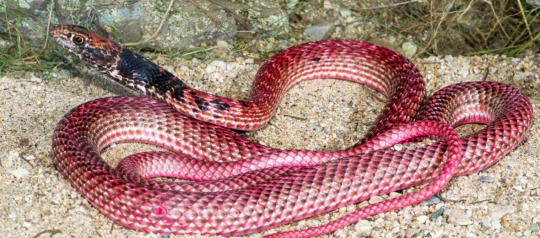
Ringwraiths: black mambas!

Mouth of Sauron: cottonmouths are by far the funniest choice. A bit literal but whatever
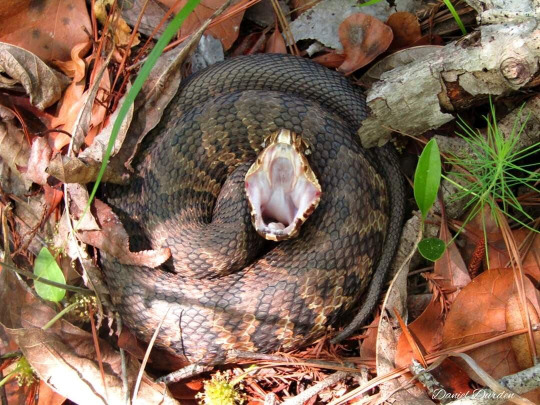
Arwen and Elrond: blue racers!
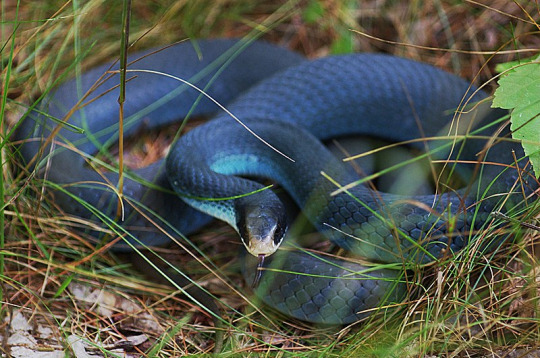
Gollum: this awful AI-generated snake I found once that made me laugh so hard I saved it to my computer

335 notes
·
View notes
Note
Saw ur Toshiro post, and I absolutely agree that Toshiro's outburst will be a stepping stone for both um an Laios to grow and that the buildup was because Shuro didn't want to ruin situation he was still trying to figure out.
But the funniest thing is, afaik, Laios and Falin are *also Foreigners* for quite far away. Their country is simply Scandinavian/northern Europe themed. I don't think we see any long-lived races in their flash backs (baring the dead man buying a ring of elves?). And both Falin and Laois definitly are the equivalent of nobility/Local chiefs kids.
But instead of being send out with all their assistants and guards, Laios ran away and suffered in the army and then on his own in a caravan , and Falin was send to a Magial School full of other races and people.
They both had time to 'adjust' to the wider world (and still carry a bit of home-grown uh...prejudice (mountain people)). So when they met Shuro both of them were well used to meeting people not from their Country. Toshiro not being either from the tiny Island or the nearby lands simply didn't mesh with how they had adapted to behave.
Plus, obviously, Laios textual Autism. But I feel like Laios could totally have figured it out if he had met people from Shuros island before who would have told him, he does after all know how to behave around Dwarves and such, who also have quite diffrent culturual norms.
Sorry for the ramble xD Good Toshiro post!
Hi hi! I’m really glad you’re adding onto my silly brain thoughts hehe - I’m super happy to hear yours, especially since they make me think more! Warning this is going to be long, talking about dungeon meshi is just a lot of fun.
When I said foreigner, I should have clarified that that I meant he’s a stranger to the CULTURE. A good chunk of the people in the island are not native to it! But culturally, they have the social background to fit in. They didn’t all come from the same place, yes, but they grew up in European-esque cultures and interacted to some extent with other races. Even Kabru and Rin are not foreign to this type of culture because they grew up with Western/European socialization.
Gonna elaborate bc I think it’s fascinating: From what we know about the Eastern islands, the worldview is very very different. In the Adventurer’s Bible where Kabru talks to Hien, they talk about how the East defines “humans” as “tallmen”, and oni/ogres were the only “other”. In the post-canon snippet where Toshiro talks to Falin, he even refers to Eastern thinking as “backward” due to the lack of long-lived races. Because of his delayed exposure to other races, and because the worldview is far more different than the one the Toudens experienced, that’s where I make the statement that he had more to adjust to.
I’ll also note, the fact that the Toudens are subjectively more adjusted to seeing and accommodating other races makes Laios’ statement that Toshiro “had an odd appearance” an even more bizarre thing to say. And although we can assume Toshiro also has his biases, we don’t see them highlighted like other characters have had (to my knowledge). So it makes it seem like he was more thoughtful/careful towards other races from the get-go, despite his lack of knowledge. His main issues were always with other tallmen, just like Laios.
It’s good to point out that the Toudens are outcasts in their own right. Both of them went through a really hard time, and it changed them. Laios’ cycle of failures and giving up and being bullied are especially important to characterizing his relationship with his sister and his disinterest in humanity and lack of close friends. Falin at least had Marcille. Both Laios and Toshiro have reasons they’re inexperienced in friendship, but one of them stated it in the story and the other didn’t. There’s more misconception about Toshiro’s character than Laios’. So my post was to talk about that one a bit.
ALSO OOO I COMPLETELY FORGOT but I WAS going to mention how both the Toudens and Toshiro came from families of influence! Thank you for bringing it up! Laios and Toshiro diverge from that upbringing, while making Toshiro and Falin a little more similar. This goes into another whole thing where Laios and Toshiro parallel (and foils?) each other but that’s too long of a discussion. Just as long is how this divergence distinguishes the Touden siblings (too many people have said their only difference is gender..)
Lastly, yes, Laios does need more exposure to Eastern people and Eastern culture to get a grasp on it. He really wants to learn! It’s just that Shuro isn’t his encyclopedia and until he gets that chance, he will make ignorant takes. I can think of two more that will occur in the main narrative alone. (but like Toshiro said, Laios has no malicious intent, that’s what makes it all the more complicated)
While there’s good conversation to be had about the fight from a ND vs NT POV, I’ve seen SO much discussion about Toshiro possibly being read as autistic too, and neurodivergent individuals who can relate to his experience. Often it comes as an intersection between both being autistic and being a poc. I think it brings even more nuance to the narrative. Plus I’m just glad there’s people who can relate to him. He’s meant to be relatable! His problem with Laios is just as much a character flaw as it is human.
Hope this post was a thoughtful response to yours, I tried to tackle everything you mentioned! Thank you sm for the ask :D
Edit: for the sake of context, here’s the og post that’s being referred to!
#dungeon meshi#delicious in dungeon#askella#shuro#toshiro nakamoto#laios touden#touden siblings#character study
76 notes
·
View notes